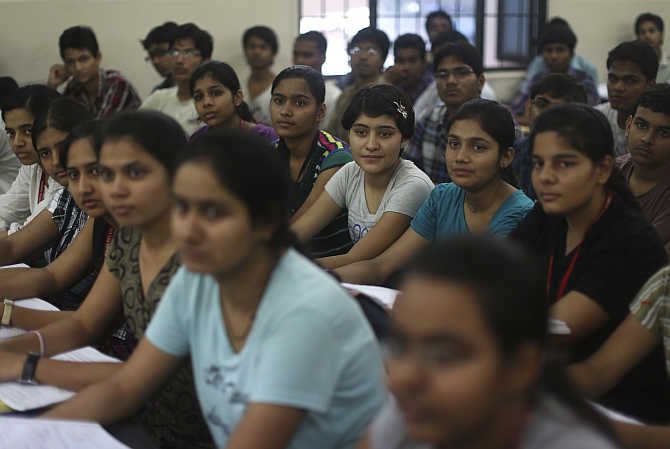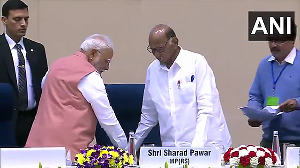On Sunday, April 17, a 16-year-old girl from Bihar, preparing for the IIT-JEE entrance exam, committed suicide in her hostel room in Kota.
She had secured admission at a coaching institute in the Rajasthan city last fortnight.
'With five big companies and scores of smaller outfits selling the same dream,' reports Anjali Puri, 'Kota is a raucous, garish free, market in education with an almost hallucinogenic feel.'
Kota, Rajasthan, is both a beacon for the educationally deprived and a cynical place in which 16 year olds live in Dickensian boarding houses, while teachers drive Audis.

In the mid-1980s, Kota girl Purnima Padmanabhan sat at V K Bansal's dining table in the JK Synthetics employees' colony, along with other aspiring engineers and was taught mathematics with a rigour she had not experienced before.
By 1994, Bansal would become so well-known for helping students crack the Indian Institute of Technology entrance exam that parents from other cities would arrive at his doorstep, beseeching him to take on their children, and he would, famously, subject them to a stiff entrance test.
But, as thousands poured in, Bansal lowered the bar and became Kota's coaching czar -- until more aggressive players overtook him.
And, Kota, a struggling industrial city in Rajasthan, with JK Synthetics closing down in 1997, and the Kota-headquartered Instrumentation Ltd turning sick, embraced a lucrative rebirth as a nucleus for engineering and medical entrance coaching.
In 1986, Bansal was a mechanical engineer with JK Synthetics, who had been diagnosed with muscular dystrophy and was in search of an alternative career.
"He was a fantastic teacher," says Padmanabhan, a vivacious 46 year old, who went on, after a degree in engineering, to an MBA from Stanford University and a successful career in the software industry.
She returns regularly to Kota from her home in the San Francisco Bay area to find the city -- and her parents' home -- changing, with new sets of women enrolled at coaching institutes coming to stay as lodgers.
Market leader Allen Career Institute says 31 per cent of its 77,000 students in Kota are young women, and you meet a tiny sample of them in Padmanabhan's parents' living room -- 18 year olds from places like Bijnore and Gorakhpur watched over by alert and kindly landlords as they work 15 hours a day to beat the 1:90 odds of getting into medical college.
Former lodger Almas Fatima, from Lucknow, who did beat the odds, believes she would not have made it to medical college in Kanpur, had Kota not given her the tools.
"School," says the second year student in a phone conversation, "doesn't prepare you to solve MCQs (multiple choice questions) with negative marking in 30 seconds. Coaching centres in Lucknow only give you past papers to solve. Kota teachers devise their own questions, hundreds and hundreds of them. They get you to understand concepts, they make you mentally tough."
As Kota's District Collector Ravi Surpur, himself a medical doctor by training, points out, these numbers cannot be dismissed as tiny. "For every child who commits suicide," he says, "there could be a thousand at various stages of depression."
"Suicide is at the end of the spectrum which originates in worry, stress, anxiety, competitive pressure, exam pressure, and the inability to meet the expectations of parents."
But even before the suicides became the big story from Kota, Padmanabhan, had been looking at her home town with disquiet.
"I have always considered coaching a great equaliser for those denied decent schooling. But I felt very sad," she says, "when I saw how mercenary coaching was becoming in Kota; how one-dimensional the students' lives were."
She had hoped Kota would morph into a university town, and, in its bare outlines, Kota does feel a bit like one.
There are students -- about 150,000 of them -- pouring out of small buildings, swarming around the city on bicycles. There are coaching complexes trying hard to look like campuses with imposing buildings, auditoria and ornamental plants.
There is a sighting of a Kashmiri, an Arunachali, a Bengali or Assamese that makes it seem as if all of India throngs here, even if three-fourths of the aspirants are from four states -- Rajasthan, Madhya Pradesh, Uttar Pradesh and Bihar.
There is indeed a sense of opportunities being created for the deprived, even if the recipients are not poor. The Bihari student is more likely to be from a place like Saharsa or Gopalganj than Patna, and the UP-ite from Sultanpur or Etawah rather than Lucknow.
Students are quite often from a family making its first foray into the world of professional education, a child of a police constable, government teacher, or very often, a "businessman", which could be anyone from a property dealer to a trader selling dals in a mandi.
New arrivals exude the nervous excitement of freshers on campus, like Poonam Dahiya, a farmer's wife from Hissar with a strong Haryanvi accent, and her expectant-looking 16 year old, both looking a bit as if they have arrived, not in a north Indian town with heaps of garbage and bad drainage, but the Oxford of the East.
But, these positive impressions begin to unravel even while they're being formed.
With five big companies and scores of smaller outfits selling the same dream, Kota is a raucous, garish free market in education with an almost hallucinogenic feel.
Four brothers who own a coaching empire, their foreheads bisected by identical long red tilaks, advertise their wares from hoardings scattered across the city. Individual teachers -- "PPS Sir", "VKP Sir", "Amit Sir" --- solicit custom with improbably glamorous posters of themselves strung up at street corners.
Parents are hardsold the idea of sending pre-teens to residential schools-cum-crammers to get a leg-up on science OIympiads.
Rank-holders in medical and engineering entrance exams, who are to Kota's spaces what Jayalalitha is to Chennai's, stare owlishly out of large cutouts and long banners rolled down the fronts of multi-storeyed coaching centres.
There is a corresponding coarseness to everyday conversation, with students, taxi drivers, shopkeepers, all sounding blase about coaching companies fighting over "toppers" and stealing each other's teachers.
You repeatedly hear the story of how Allen and Aakash, another coaching company, put out triumphant ads in 2015 laying claim to the very same seven names from the top ten in the All India Pre Medical Test. Or the observation that Bansal Classes is no longer the go-to place because it has been "raided" far too often for its teachers.
Raided? Pramod Maheshwari, CEO of the publicly listed coaching company, Careerpoint, and a lively raconteur, explains how such a heist is conducted.
"It's done with careful planning. The teachers work all day, as normal. Their employers only get to know when they see an ad with their names and faces in the papers the next morning. Then, they discover some students have also left." Has he done it? "It was done to me once so I replied in kind," he says calmly. "After that my teachers were not poached."
Allen, which boasts a teaching staff of 1000 in Kota, including 200 IIT graduates and 50 MBBS doctors, is the main beneficiary of such migrations.
Unsurprisingly, it is the city's best paymaster, and its "campuses" feature huge classrooms where teachers wearing lapel mikes address 200-plus students. Deepak Gautam, Vice President HR, confirms that it is possible for senior teachers to earn "in crores" annually.
Is it true that Allen's teachers drive Audis and BMWs? "I think I have seen an Audi," Gautam says carefully, "but I'm not sure of the BMW."
Lead image published only for representational purposes. Photograph: Ahmad Masood/Reuters












 © 2025
© 2025